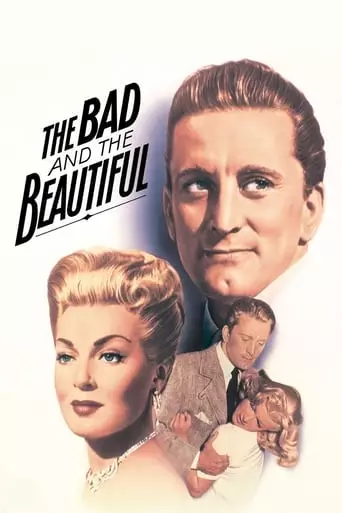
The Bad and the Beautiful (1952) Watch Online Free
Told in flashback form, the film traces the rise and fall of a tough, ambitious Hollywood producer, Jonathan Shields, as seen through the eyes of various acquaintances, including a writer, James Lee Bartlow; a star, Georgia Lorrison; and a director, Fred Amiel. He is a hard-driving, ambitious man who ruthlessly uses everyone on the way to becoming one of Hollywood’s top movie makers.
The Bad and the Beautiful (1952), directed by Vincente Minnelli, delves into the complexities of ambition and betrayal within the Hollywood film industry. The story is told through the eyes of three people—Georgia Lorrison (Lana Turner), a troubled actress; Fred Amiel (Barry Sullivan), a director; and James Lee Bartlow (Dick Powell), a writer—who were once closely involved with the ruthless movie producer Jonathan Shields (Kirk Douglas). Each of these individuals is now estranged from Shields, who has used them to climb the ranks of Hollywood success.
The film opens with Shields, now a penniless and disgraced producer, trying to persuade his former collaborators to work with him one last time. Through flashbacks, we learn about the personal and professional betrayals that led to their estrangement. For Amiel, it was the crushing realization that his dreams of directing were manipulated by Shields. For Lorrison, it was the false promises of love that turned out to be nothing more than strategic moves for Shields’ gain. For Bartlow, it was the tragic affair between his wife and an actor, which Shields orchestrated, leading to personal and professional devastation. Despite the pain, each of these individuals has ultimately benefited from their involvement with Shields, though at great personal cost.
Analysis and Themes
The central theme of The Bad and the Beautiful revolves around the destructive nature of ambition and the moral compromises that individuals make in pursuit of success. Jonathan Shields is depicted as a complex character—ruthless, driven, and willing to sacrifice anyone to achieve his goals. His journey reflects the darker side of Hollywood, where the pursuit of fame and fortune often leads to exploitation and betrayal.
The film also explores the nature of artistic creation and the tension between personal integrity and professional ambition. While Shields is portrayed as a brilliant producer, his success comes at the expense of the people around him. The movie critiques the way Hollywood manipulates its stars and creators, turning their lives into commodities for the sake of profit.
Another significant theme is the idea of redemption and the complex relationships between creator and collaborator. Despite the betrayals, the film does not offer a clear-cut judgment on Shields’ character. Instead, it presents a nuanced portrayal of his flaws, showing that while his actions were harmful, they were also driven by a deep desire to prove himself in a world that values power above all else.
Impact of the Movie
The Bad and the Beautiful had a profound impact on how Hollywood was viewed in cinema. It provided a rare, unflinching look at the inner workings of the film industry, exposing the power dynamics, manipulation, and sacrifices that often go unnoticed behind the glitz and glamour. The film’s portrayal of Hollywood as a place where personal relationships are expendable for the sake of success resonated with audiences, especially at a time when the studio system was beginning to crumble.
The movie also stands out for its complex characters, especially the portrayal of Jonathan Shields, who remains one of Kirk Douglas’s most iconic roles. The film’s success in portraying the moral ambiguity of its protagonist made it a precursor to more modern films that explore the darker sides of fame and ambition.
After watching The Bad and the Beautiful, you may feel a mix of admiration and discomfort. The film leaves you with a lingering sense of the moral compromises people make in the pursuit of success. You might feel sympathy for the characters, especially Jonathan Shields, whose ambition leads him to destroy everything around him. At the same time, you may be unsettled by the way Hollywood exploits its people, leaving you questioning the price of fame and success. Ultimately, the film’s emotional complexity will likely stay with you long after the credits roll, provoking reflection on the nature of ambition, betrayal, and human relationships
